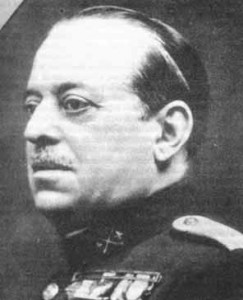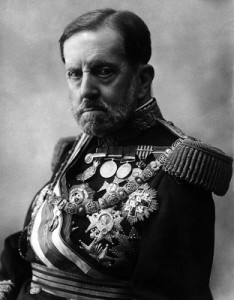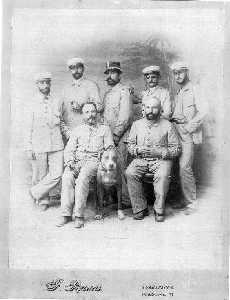GENERALES ESPAÑOLES EN LAS GUERRAS CUBANAS
Mucho se ha hablado, sin llegar a concretarse las cifras del número de generales y soldados que España disponía en la Isla de Cuba al desencadenarse la Guerra de Independencia. Pero la cifra definitiva de generales, según estudios realizados por el Dr. Perez Gutierrez, es de 92 generales. Todos estos generales fueron hombres experimentados en la teoría y en la práctica de la guerra, conocedores incluso del país en que operaron. El valor y el honor primaron en la mayoría de ellos, que luchó en defensa de sus intereses patrios. Eso, apunta, engrandece todavía más a nuestros mambises, capaces de derrotar a los principales estrategas y tácticos españoles de su época. Victoria que enaltece a los cubanos y no niega méritos al enemigo.
En cuanto a los soldados. dice el investigador, la conformaban 20,693 hombres en las fuerzas regulares y 69, 785 en las de voluntarios, para un total de más de 90 mil efectivos. Ese llamado Ejército de Cuba estaba al mando del teniente general Emilio Calleja, gobernador de la colonia, y contaba con dos generales de división, José Arderius y José Lachambre, además de otros dos generales de brigada. En todos los mencionados era vasta su experiencia “cubana”. Calleja combatió en la Guerra Grande, en la que obtuvo el grado de general, y en la Chiquita, y había sido con anterioridad gobernador de la Isla; llevaba 50 años de servicio activo en el ejército. También en la Guerra Grande participaron Lachambre y el segundo cabo Arderius, nacido en La Habana y concuño de Martínez Campos. Si el general de brigada Luis Prats, jefe militar de Matanzas, pudo sofocar en los primeros momentos la insurrección dentro de su territorio, no pudo Lachambre hacer lo mismo como jefe de la plaza oriental pese a que desde el primer momento se incorporó a la persecución de la expedición que trajo a Maceo por Duaba.
Pronto los reportes satisfactorios sobre el curso de la contienda que remitía Calleja a España fueron sustituidos por mensajes alarmantes. En consecuencia, el capitán general Martínez Campos asumió el mando de la Isla y se reforzó el Ejército de Cuba. En nueve expediciones y en un envío desde Puerto Rico llegaron 117 795 hombres, con los que la fuerza española se elevó a más de 200 mil efectivos y se quintuplicó el número de oficiales. Todo ese gran ejército no pudo detener el impulso de la Invasión. Con una tropa que no llegaba a los 5 000 combatientes el contingente invasor, el 15 de diciembre de 1895, destroza en Mal Tiempo, cerca de Cienfuegos, a los adversarios que se le interponen y entra en Matanzas, pasa a La Habana y amenaza a la misma capital y sigue su avance victorioso hacia el confín más occidental. A Martínez Campos, el gran vencedor de la Guerra Grande, no le queda más remedio que reconocer que Cuba se ha perdido para la metrópoli y que España no tiene otro camino que el de arrasar el país. Pero él no es capaz de hacerlo y así lo asegura. Correspondería tan triste empresa a su sustituto, el teniente general Valeriano Weyler. La situación era caótica. Maceo operaba en Pinar del Río, Máximo Gómez, con crecidas fuerzas, se hallaba en La Habana. Estaban cortadas las líneas telegráficas y sufría interrupciones el cable del sur entre la capital y Batabanó. Los soldados debían transportarse por mar… “Todo acusaba un estado de gravedad tal, diría Weyler, que hacía difícil el mando que iba a ejercer”.
Afirma el doctor Pérez Gutiérrez que Weyler podrá ser acusado de cruel, sanguinario, tozudo, aprovechado, ególatra y falsificador de la verdad, pero hay que admitir que tuvo la habilidad de reorganizar las fuerzas a su mando, activarlas y ponerlas a la ofensiva. Logró detener el avance mambí y llevó la situación militar a un nivel de estancamiento. Disponía de 249 441 hombres con 26 generales, el más numeroso ejército que tuvo España en América hasta ese momento, pero aun así el Ejército Libertador se hacía sentir, en unas más que en otras, en todas las provincias y proseguía la guerra.
Es bajo el mando de Weyler que ocurre la muerte de Maceo y, en La Habana, la de Adolfo del Castillo. Artilló el puerto habanero y zonas portuarias del interior y previó que España tendría que enfrentarse a EE UU. Se dice en su expediente que inició el estudio de las defensas submarinas que deberían instalarse en caso de conflicto con ese país. Dio por dominada la insurrección en las provincias occidentales, eso decía, y cuando pensaba batir a los mambises en Oriente se vio obligado a solicitar el relevo. Su expediente no lo atribuye al fracaso en el campo militar, que es lo cierto, sino a una cuestión política. Cánovas del Castillo, aquel presidente del gobierno español que se empeñó en dedicar hasta el último hombre y la última peseta a la guerra de Cuba, resultó muerto en un atentado y su sucesor, Sagasta, era partidario de otra conducta hacia la colonia. El capitán general Blanco Erenas ocuparía el puesto de Weyler. Ya había estado en Cuba. Logró sofocar la Guerra Chiquita. Tenía fama de liberal, pero llegaba ahora a intentar lo imposible.
 El Gral.Sanjurjo peleo en Cuba (1896)
El Gral.Sanjurjo peleo en Cuba (1896)
La autonomía enarbolada por Blanco como política de apaciguamiento, no convenció a nadie. Ni al elemento español más recalcitrante ni a los separatistas. Fracasó aun entre los propios autonomistas criollos. Curiosamente ese pretendido apaciguamiento no se vio acompañado de la disminución de las tropas bajo su mando. Aumentaron. Blanco dispuso de 1 502 hombres más que Weyler en lo que respecta a fuerzas en campaña. El ejército regular a sus órdenes descendió en número, pero aumentaron los voluntarios, lo que hizo que en ese momento España tuviera en Cuba una fuerza superior a los 278 mil hombres, la más alta de todos los años de la guerra.
Blanco tuvo a 33 generales entre sus colaboradores más cercanos. Casi ninguno de los generales de Weyler se quedó en Cuba a la sustitución de este. Alegaron motivos de salud para regresar a España. En verdad eran seguidores sumisos de su jefe y enemigos de la política que Blanco quería propiciar. Es bajo Blanco que sobreviene la entrada de EE UU en la contienda. El 26 de noviembre de 1898 el gobierno interino de la Isla quedaba en manos del teniente general Jiménez Castellanos, derrotado por Máximo Gómez en la batalla de Saratoga. El sería el encargado de traspasar la soberanía española en Cuba al general Brooke, interventor militar norteamericano, a las doce meridiano del 1 de enero de 1899. Enseguida, a bordo del vapor Rabat, partió hacia Matanzas y el 12 pasó a Cienfuegos. Saldría de Cuba en el vapor Cataluña con destino a la península el 6 de febrero. Fue el último general español que abandonó la Isla y llevaba con él lo que quedaba de su ejército.
RESUMEN
De esos 92 altos oficiales españoles que operaron en Cuba, tres tuvieron el grado de capitán general. Dos de ellos –Martínez Campos y Blanco- lo ostentaban antes de venir y Weyler lo alcanzó después. Muchos de ellos arribaron como coroneles y tenientes coroneles y uno incluso como comandante y ascendieron por su participación en la contienda. La mayor parte de ellos pertenecía a la infantería. Siete nacieron en Cuba y por lo menos uno hizo la carrera militar en la Escuela de Cadetes de La Habana. Andrés González Muñoz, santiaguero, enfrentó en varias ocasiones a su coterráneo Antonio Maceo. Tras la Paz del Zanjón y el pronunciamiento de Maceo en Baraguá, el coronel González Muñoz se reúne con el Titán.
En compañía de un ayudante Gonzalez Munoz y el práctico que le sirve de guía, lo visita en su campamento de Palmarito, a veinte leguas de Mayarí. Maceo lo recibe, conferencian, pero no logra convencerlo de que deponga las armas. Ya como general de brigada participaría en la Guerra Chiquita y es general de división al iniciarse la de Independencia. Sería segundo cabo en la capitanía general de Puerto Rico. La mayoría de esos oficiales requirieron de más de treinta años de servicio para acceder al generalato. Pero Pando Sánchez lo logró solo en 13 y Emiliano Loño demoró 47. De esos generales, el que arribó más joven a Cuba (con 40 años) fue Federico Escario, ascendido a general de brigada cuando, a fines de la guerra, logró penetrar con refuerzos en la sitiada ciudad de Santiago de Cuba. Pero Ramón Echagüe llegó a la Isla ya como general y tenía sólo 42. El más viejo en el momento de su arribo fue el general de división Carlos Denis (68). De esos generales, doce murieron en Cuba y de ellos, diez fallecieron por enfermedad y dos en combate, aunque nueve resultaron heridos en acciones de guerra.
CiroBianchiRoss/PerezGutierrez/InternetPhotos/TheCubanHistory.com
Generales Españoles en las Guerras Cubanas
The Cuban History, Hollywood.
Arnoldo Varona, Editor
Por las calles de La Habana Vieja
FOTO por Roberto Suárez — with Niurka De La Nuez, Manuel Otero, Lorenzo Nasti, Betty Bu Chavez, Daniel Bañuelos Flores and Los Sitios Centro Habana.

SPAIN GENERALS in the Cuban Wars
Much has been said without actually materialize the figures on the number of generals and soldiers that Spain had on the island of Cuba at the outbreak of the War of Independence. But the final number of generals, according to studies by Dr. Perez Gutierrez is 92 overall. All these generals were men experienced in the theory and practice of war, knowing that even the country operated. The value and honor prevailed in most of them, who fought in defense of their patriotic interest. That, he says, further enhances our mambises, capable of defeating the Spanish top strategists and tacticians of his time. Victory that lifted up the Cubans and the enemy does not deny merit.
As for the soldiers. says the researcher, made up 20,693 men in the regular forces and 69,785 in the volunteers, for a total of over 90 thousand soldiers. That call was Cuba Army under Lieutenant General Emilio Calleja, governor of the colony, and had two major generals, Jose and Jose Arderius Lachambre, plus two brigadier generals. In all the above was vast experience “Cuban.” Calleja fought in the Great War, where he obtained the rank of general, and the Chiquita, and had previously been governor of the island, had 50 years of active military service. Also in the Great War and the second part Lachambre out Arderius, born in Havana and concuño Martinez Campos. If Brigadier General Luis Prats, commander of Matanzas, may at first put down the insurrection within its territory, could not do the same Lachambre as head of the east street, although from the first moment he joined the chase of the expedition that brought by Duaba Maceo.
Soon satisfactory reports on the progress of the war that Calleja remitted to Spain were replaced by alarming messages. Consequently, Captain General Martinez Campos took over the island and strengthened the army in Cuba. In nine expeditions and in a shipment arrived from Puerto Rico 117 795 men, with which the Spanish force was increased to more than 200 thousand soldiers and quintupled the number of officers. All that great army could not stop the momentum of the invasion. With a band that was less than 5000 fighters the invading, the December 15, 1895, in Bad Weather wrecks, near Cienfuegos, the opponents will stand and into Matanzas, Havana and passing threat the capital itself and continues its victorious advance toward the western boundary. A Martinez Campos, the big winner of the Great War, he has no choice but to recognize that Cuba is lost to the metropolis and that Spain has no other way but to sweep the country. But he is not able to do so and so said. Correspond so sad business his replacement, Lt. Gen. Valeriano Weyler. The situation was chaotic. Operated Maceo in Pinar del Rio, Maximo Gomez, with flood forces, was in Havana. Telegraph lines were cut and suffered interruptions south cable between the capital and Batabano. The soldiers were transported by sea … “All accused a state of such gravity would Weyler, which made it difficult to control who would exercise”.
Says Dr. Perez Gutierrez Weyler may be accused of cruel, bloody, stubborn, exploited, egotistical and falsifier of the truth, but one must admit that had the ability to reorganize the forces under his command, and activate them on the offensive. He managed to stop the advance and took mambí the military situation at a level of stagnation. It had 249 441 men with 26 general, the largest army that had Spain in America so far, but still the Liberation Army was felt in some more than others, in all provinces and continued the war.
It is under the command of Weyler death occurs and Maceo in Havana, the Adolfo del Castillo. Artillo the Havana port and harbor areas of the interior and predicted that Spain would face the U.S.. It says in your file that initiated the study of underwater defenses should be installed in case of conflict with that country. Gave dominated the insurrection in the western provinces, it said, and when I thought mambises beat the East was forced to seek relief. His record is not attributable to failure in the military field, that is true, but a political issue. Canovas del Castillo, Spanish prime minister that it was determined to spend every last man and the last peseta to the war in Cuba, was killed in an attack and his successor, Sagasta, was in favor of another behavior toward the colony. Captain General Blanco Erenas occupy the post of Weyler. I had been to Cuba. He managed to quell the Little War. He was reputed liberal, but now came to attempt the impossible.
 El Gral.Sanjurjo peleo en Cuba (1896)
El Gral.Sanjurjo peleo en Cuba (1896)
The autonomy wielded by White as a policy of appeasement, did not convince anyone. Neither the Spanish element most recalcitrant or separatists. Failed even among themselves Creole autonomists. Interestingly this alleged appeasement was not accompanied by the decrease of the troops under his command. Increased. White disposed of 1 502 men more than Weyler in regard to fielded forces. The regular army under his orders declined in number but increased the volunteers, which he did at that time Spain had in Cuba a force greater than the 278 thousand, the highest of all the years of war.
White had a 33 generals among his closest associates. Almost none of Weyler’s generals remained in Cuba to replace this. Alleged health reasons to return to Spain. Were really submissive followers of his boss and political enemies of the White wanted to promote. It comes under White to U.S. entry into the fray. On November 26, 1898 the interim government of the island was in the hands of Lt. Gen. Jimenez Castellanos, Maximo Gomez defeated at the Battle of Saratoga. The transfer would be in charge of Spanish sovereignty in Cuba to General Brooke, U.S. military auditor, at twelve noon of January 1, 1899. Then, on board the steamer Rabat, left for Matanzas and 12 went to Cienfuegos. Come out of Cuba on the steamer bound for Catalonia peninsula on 6 February. It was the last Spanish general who left the island and carried with him the remnants of his army.
SUMMARY
Of these 92 senior Spanish officials operating in Cuba, three had the rank of captain general. Two of them-Martínez Campos and White-it boasted before he came and caught him after Weyler. Many of them arrived as colonels and lieutenant colonels and one even as a commander and promoted by their participation in the contest. Most of them belonged to the infantry. Seven were born in Cuba and at least one made the military cadet school in Havana. Andrés González Muñoz, Santiago, repeatedly faced his compatriot Antonio Maceo. After the Peace of Zanjon and Maceo’s pronouncement in Baragua, Colonel Munoz Gonzalez meets with the Titan.
Accompanied by an assistant Gonzalez Munoz and practical guide him, visits him in his camp Palmarito, twenty leagues from Mayari. Maceo receives it, confer, but fails to convince him to disarm. And participate as a brigadier general in the Little War and Major General at the beginning of Independence. It would be second place in the Captaincy General of Puerto Rico. Most of those officers required more than thirty years of service to access the generals. But Sanchez Pando did it only took 13 and Emiliano Loño 47. Of those generals, who arrived in Cuba younger (40 years) was Federico Escario, promoted to brigadier general when, at the end of the war, managed to penetrate reinforced in the besieged city of Santiago de Cuba. But Ramon Echagüe reached the island and as a general and had only 42. The oldest at the time of his arrival was Major General Charles Denis (68). Of those generals, twelve died in Cuba and of these, ten died of disease and two in combat, although nine were injured in acts of war.
CiroBianchiRoss/PerezGutierrez/InternetPhotos/TheCubanHistory.com
Generales Españoles en las Guerras Cubanas
The Cuban History, Hollywood.
Arnoldo Varona, Editor



 © SPAIN GENERALS in the Cuban Wars (Video/Photo) * * GENERALES ESPAÑOLES en las Guerras de Cuba (Video/Photos).
© SPAIN GENERALS in the Cuban Wars (Video/Photo) * * GENERALES ESPAÑOLES en las Guerras de Cuba (Video/Photos).


